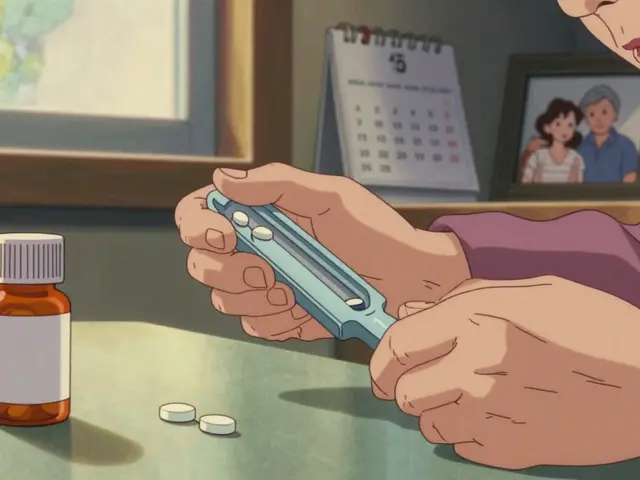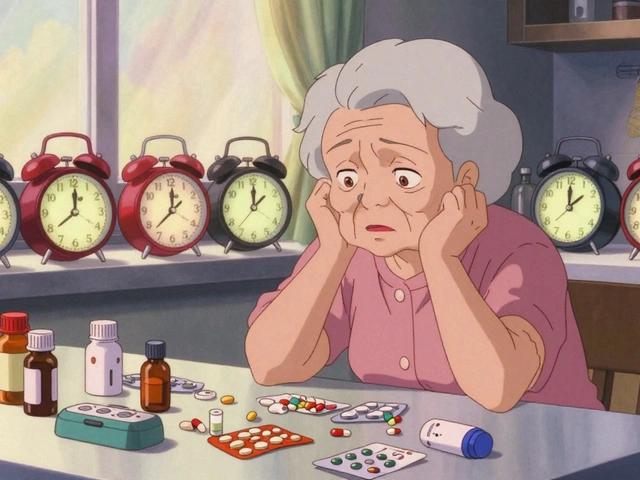Ever feel your heart knocking around in your chest after a crazy day? Or hear stories about someone you know dealing with blood pressure issues and suddenly getting handed a pack of pills? For a lot of folks, Toprol isn’t just a pill they read about—it's sitting right there in the medicine cabinet, part of their daily routine. So what’s really going on with this little white tablet? There’s more to the story than medical jargon tossed out by busy doctors.
What Exactly is Toprol and How Does it Work?
Toprol, known generically as metoprolol, is a beta blocker. Yeah, "beta blocker" sounds like some superhero gadget, but the truth is way less dramatic. Toprol’s main job is to slow your heart rate and make it easier for your heart to pump blood. It does this by blocking certain hormones—adrenaline is the big one—that can make your heart race or pound too hard. This medicine comes in two versions: Toprol XL (long-acting, taken once a day) and the shorter-acting regular metoprolol (usually twice a day).
The idea is to take the edge off your heart's workload, especially if you've got high blood pressure or have already had a heart attack. But metoprolol doesn’t just care about your ticker; it's sometimes thrown at folks with migraines, anxiety, and even certain kinds of tremors. Ever noticed how stress makes everything feel worse? Toprol calms that alarm bell your heart sets off when your mind spirals. Think of it as putting your heart on cruise control, stopping it from overreacting to every little thing.
If you look at the prescription rates here in South Africa, Toprol sits in the top ten for heart medications. You’ll find it in pharmacies across Durban, right alongside everyday essentials. It's been around for decades and is on the World Health Organization’s List of Essential Medicines, which tells you this stuff is about as tried-and-tested as you get in pharma.
Doctors often choose Toprol for people with angina (that’s chest pain from blocked arteries) or anyone who’s had a heart attack, since it lowers the chance of complications afterward. It's also famous for calming high blood pressure, even though there are dozens of ways to lower BP. So, it's not flashy, but it's reliable—and over the years, researchers have piled up mountains of evidence proving its value, especially for heart conditions and after heart attacks.
Who Should Take Toprol—and Who Shouldn’t?
If your doctor writes "Toprol" on that little blue script pad, they’re probably thinking about high blood pressure, angina, or heart rhythm issues. But Toprol’s club isn’t open to everyone. For instance, if you have asthma, doctors usually steer clear—blocking those beta-receptors might make your airways clamp up. People with slow heart rates or certain heart block problems shouldn't use it either, since it slows things down even more.
Folks dealing with anxiety sometimes get metoprolol for the physical symptoms—think sweaty palms, rapid heartbeat—if other medications don’t quite do the trick. There’s even some use for stage fright or exam nerves. But mental health uses are a bit more off-label, so always check with a doctor who knows your story.
Bear in mind, Toprol can interact with other meds: sleeping pills, allergy medicine, other blood pressure drugs, and even some antidepressants. Mixing the wrong handful of pills can mess with your heart rhythm or make you feel faint, so keep that medication list updated. If you’re diabetic, you need to be extra careful. Toprol might mask some of the warning signs of low blood sugar, like a racing heart. This could leave you in a sticky spot if you rely on those signs.
If you’re pregnant or breastfeeding, Toprol is usually not the first choice, but sometimes doctors will decide the benefits outweigh the downsides. They’ll monitor things closely. Always let your doctor know if you’re planning a family or notice any unusual symptoms.

Benefits and Real-World Impact of Toprol
A lot of people only see the downsides when a new pill enters their life, but there’s a reason Toprol is so entrenched in heart care. Studies show it can lower the risk of future heart attacks, ease agony from angina, and keep blood pressure in a healthier range. If you’ve ever heard someone talk about "swallowing the frog"—doing the thing you don’t want to do for long-term gain—taking Toprol is just that for a lot of people with heart issues.
One of the quiet perks is fewer emergency trips to the hospital. When people take Toprol as prescribed, their odds of landing in ER with chest pain or an irregular heartbeat drop. That’s a big deal if you’ve ever waited hours at King Edward Hospital, just wanting to know your heart’s going to keep ticking.
For people who exercise, there’s a fascinating twist—Toprol can blunt the normal “getting out of breath” feeling. That means you might not push your heart rate as high during workouts, which can feel weird if you’re used to monitoring your pulse on a smart watch. Some say they have to get creative and use RPE (rate of perceived exertion) instead.
Outside the heart, there’s research hinting Toprol might help reduce the frequency of migraine attacks. Not all doctors get on board with this use, but in practice, if you’re getting migraines plus high blood pressure, you sometimes score a “two for one” on the prescription. Some athletes and performers even use it for “performance anxiety,” though long-term use just for those nerves isn’t how it’s meant to be prescribed.
The bottom line? Life with Toprol often means more peace of mind, especially for people who already had a close call with their heart. While it’s not a magic bullet, its benefits play out quietly in the background, helping folks keep their lives on track.
What Are the Possible Side Effects and Risks?
Let’s be straight—no medication comes without tradeoffs, and Toprol is no exception. Probably the most common side effect people moan about is feeling tired or low on energy. Your heart isn’t racing, but sometimes it feels like neither are you. You might get dizzy standing up too fast. There’s also a chance you’ll notice cold hands or feet, thanks to slower blood flow out to the skin.
Other stuff sometimes pops up, like sleep problems, weird dreams, or even mild shortness of breath. Not everyone gets these, but if you do, talk to your doctor—sometimes tweaking the dose can help. In rare cases, Toprol can affect your mood, making some folks feel blue or even slightly depressed. Anything that changes your headspace like that should be flagged straight away.
Sexual side effects sometimes crop up, too, like lower sex drive or occasional difficulties with performance. Again, this isn’t everyone, but it’s something a lot of people are embarrassed to mention. Don’t suffer in silence—your healthcare team has probably heard it all before.
For people with asthma or lung issues, Toprol can narrow the airways, so those folks usually get different meds. And stopping Toprol suddenly can seriously mess with your heart rhythm and blood pressure, so never just quit without checking in with your doc. Tapering down slowly is the safe way if you ever need to switch medications.
As for dangerous reactions? Rare, but worth mentioning. Allergic reactions (rash, swelling, severe shortness of breath) demand an emergency call. And if you ever feel faint, confused, or experience an especially slow heart rate, get help fast. The good news? With the right dose and regular follow-up, most people get on with life without serious issues.

Tips for Living Well with Toprol
Getting the most from Toprol is about more than just taking the pill at the right time. Keep a regular schedule—this drug likes consistency. Try to take it with food to avoid a sour stomach, and set an alarm on your phone so you don’t miss doses. Missing a single dose usually isn’t a crisis, but take it as soon as you remember (unless it’s almost time for the next one—then just skip).
Track your blood pressure and heart rate. Most Durban chemists will show you how to use a BP monitor, and you can get an affordable one for home. Write it down every week—patterns are way more useful than a single reading. If you’re suddenly getting much lower readings or feeling off, speak to your health provider promptly.
Some foods can change how your body handles Toprol. Grapefruit, for instance, messes with lots of meds, including some beta blockers. Go easy, and always double-check when you’re starting new foods or supplements. If you drink alcohol, know that it can drop your blood pressure even more, making you dizzy. Moderation is the name of the game.
Try not to stress too much about side effects. Most settle down after a few weeks as your body gets used to the new routine. If you’re struggling with something that won’t go away, like persistent tiredness or blue moods, talk to your doctor. There are often tweaks that can make a big difference. Joining a local support group or reading online stories (Reddit or even Facebook groups) can offer perspective—and remind you you’re not doing this alone.
One last tip: keep extra pills handy if you travel, and carry your prescription information in your wallet or on your phone. Emergencies don’t come with warnings, and no one wants to be stranded without their meds. In Durban’s sticky summer heat, keep your pills in a cool dry spot; don’t leave them in the glovebox, where the temperature climbs fast. Your future self will thank you.
So, if you find Toprol—or any beta blocker—part of your day, you’re not unusual. Millions worldwide are swallowing the same pill, chasing after steady hearts and calmer lives. Staying informed and following a few simple habits make a big difference. Your doctor, pharmacist, and even regular folks taking the same stuff are all in your corner. If you’ve got questions or worries, ask—no question is too small when it comes to your health.







Rohini Paul
15 June, 2025 01:17 AMI’ve been on Toprol for 3 years after my panic attacks got out of hand. Honestly? It didn’t fix my anxiety, but it stopped my heart from feeling like it was trying to escape my chest during meetings. I still get sweaty palms, but now I can breathe through it. No magic, just steady. Also, weirdly, my migraines dropped by half. Didn’t expect that.
Courtney Mintenko
16 June, 2025 16:22 PMToprol is just capitalism in pill form. They sell you calm by slowing your heart. Who even decided that a racing heart is the problem and not the world that’s making it race? We’re medicating symptoms while the system burns. 🤡
Sean Goss
18 June, 2025 11:01 AMMetoprolol succinate vs tartrate - if you're not aware of the pharmacokinetic differences, you're just guessing. Toprol XL has a half-life of 7–12 hours, extended-release profile, CYP2D6 metabolism, first-pass effect. Most people don't realize that non-adherence to timing causes fluctuating plasma concentrations. That’s why some report ‘ineffectiveness’ - it’s not the drug, it’s the dosing schedule. Also, beta-blockers are not first-line for HTN per ACC/AHA 2023 guidelines anymore. You’re behind.
Khamaile Shakeer
18 June, 2025 13:45 PMOkay but have you tried yoga?? 🧘♂️ Toprol is just a Band-Aid. I stopped mine after 6 months and now I meditate, drink turmeric tea, and my BP is LOWER. Also, your doctor probably gets kickbacks from AstraZeneca. 🤫💊
Suryakant Godale
20 June, 2025 00:36 AMWhile I appreciate the comprehensive overview provided, I would respectfully suggest that further elaboration on the pharmacodynamic interactions between metoprolol and selective serotonin reuptake inhibitors may be warranted, particularly in light of recent studies indicating potential QT interval prolongation in polypharmacy scenarios. Additionally, the mention of grapefruit interaction is accurate but incomplete; citrus aurantium and Seville oranges may also influence CYP3A4-mediated metabolism. A citation to the 2022 Cochrane review on beta-blockers in post-MI care would strengthen the evidence base.
John Kang
21 June, 2025 19:10 PMBeen on this for 4 years. The fatigue? Yeah, it’s real. But I’d rather be tired than dizzy and in the ER. Keep taking it. Your heart doesn’t know you’re tired - it just knows you’re alive. One day at a time. 💪
Bob Stewart
23 June, 2025 09:11 AMMetoprolol is indicated for hypertension, angina pectoris, myocardial infarction, and certain arrhythmias per FDA labeling. Off-label use for performance anxiety is documented in clinical literature but remains non-FDA approved. The WHO Essential Medicines List classification reflects global accessibility, not efficacy superiority. Caution is advised in patients with metabolic syndrome due to masking of hypoglycemia symptoms. Dose titration should be individualized based on heart rate response, not symptom perception.
Simran Mishra
24 June, 2025 00:25 AMI took Toprol after my divorce and honestly, I think it made me more depressed. Not because of the drug, but because I felt like my body was betraying me - I couldn’t even feel my heart beating fast anymore, not even when I cried. I used to feel everything, now I’m just… numb. And my ex didn’t even care. He just said, ‘Oh, you’re on meds now, that explains everything.’ Like my pain was just a side effect to be managed. I miss being able to feel. Even the bad parts. Even the heartache. Now I just sit here, quiet, with my pills, wondering if I’m still me.
ka modesto
25 June, 2025 05:28 AMMy dad’s been on Toprol XL since his heart attack in 2018. He’s 72, walks 2 miles every morning, and still makes the best chili in the county. He says it didn’t change his life - it just gave him one. Don’t let the side effects scare you. Talk to your doc, track your numbers, and don’t stop cold turkey. That’s how you end up in trouble. You got this.
Holly Lowe
25 June, 2025 14:08 PMToprol is basically your heart’s chill pill. Imagine your heart is a toddler screaming in a Target aisle - Toprol is the parent who says, ‘Breathe, baby, breathe.’ And yeah, you might feel like a zombie at first, but after a few weeks? You start noticing the quiet moments. The sunrise. The way your dog sighs when he curls up next to you. That’s the magic. Not the pill. The peace it buys you.
Cindy Burgess
27 June, 2025 02:54 AMIt is worth noting that the efficacy of metoprolol in migraine prophylaxis remains controversial, with meta-analyses demonstrating only modest benefit over placebo. Furthermore, the prevalence of sexual dysfunction in beta-blocker users is underreported in primary care settings, likely due to patient embarrassment and physician omission. The assumption that ‘most side effects settle down’ is misleading; for some, they persist indefinitely. Caution is advised.
Sean Goss
27 June, 2025 04:07 AMActually, the 2023 ACC guidelines downgraded beta-blockers for primary HTN because ARBs and CCBs have better outcomes in low-risk patients. But for post-MI? Still gold standard. You’re conflating indications. Also, ‘performance anxiety’ use is anecdotal - no RCTs support it for non-cardiac patients. Don’t turn a lifesaver into a party trick.